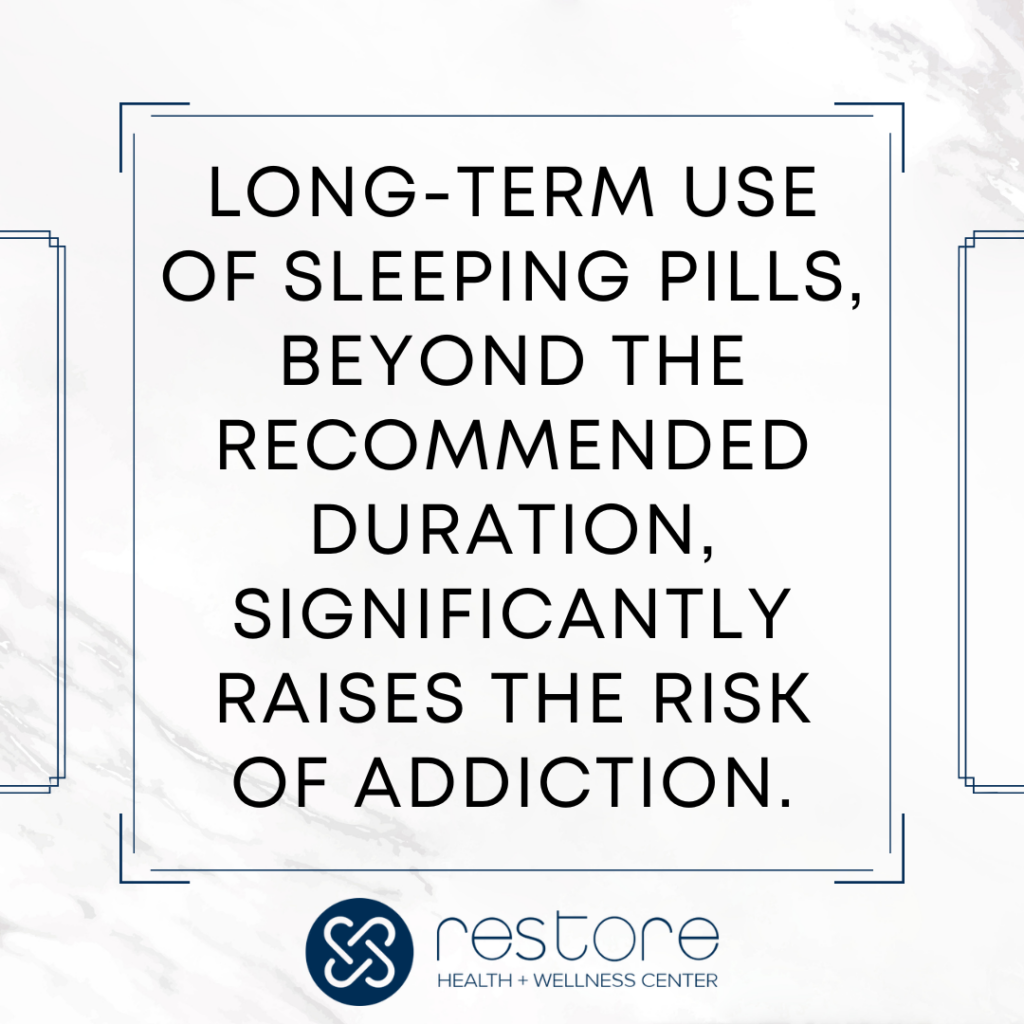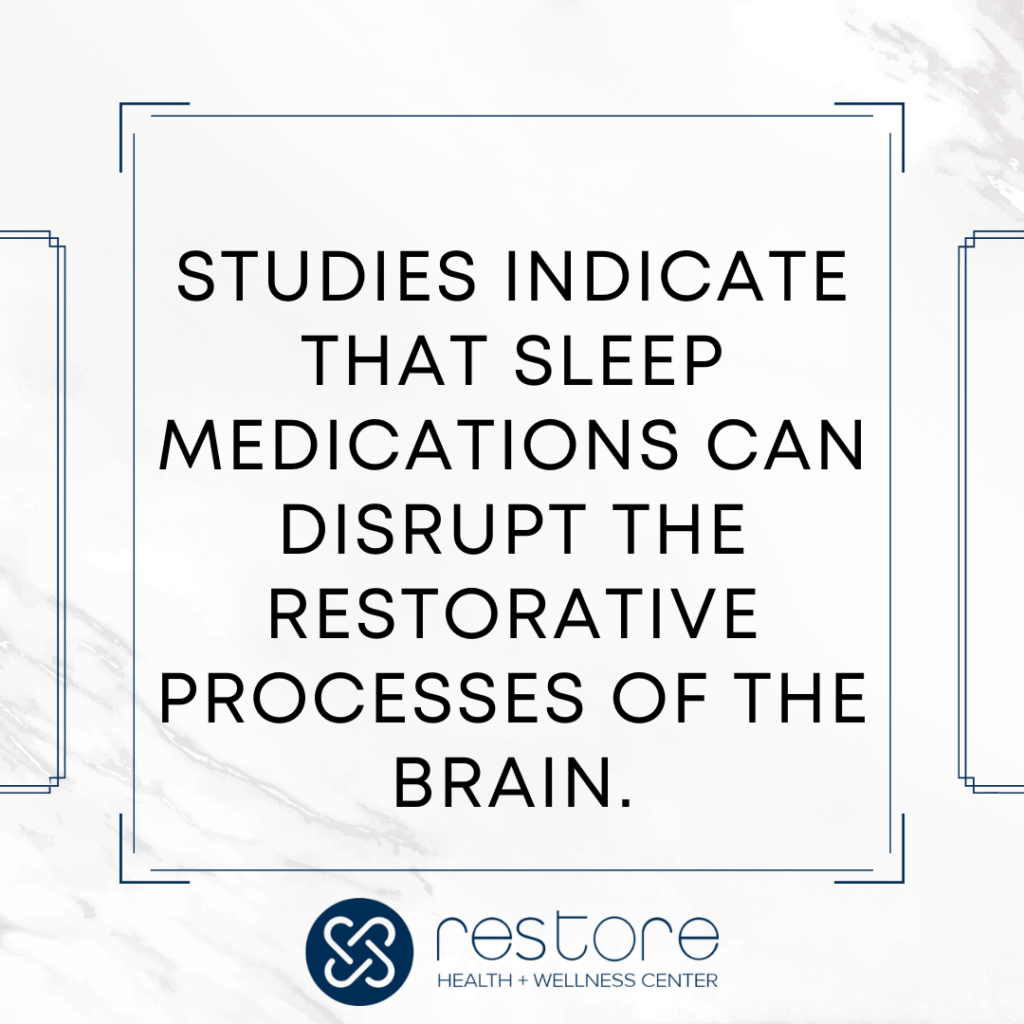
Have you ever found yourself reaching for that little pill to escape into a night of peaceful slumber? But what if it has become more of a necessity than a choice?
The rise in sleeping pill use has cast a shadow over the elusive quest for rest, unearthing concerns about sleeping pills addiction—a condition more common and closer to home than many realize.
This blog goes into the heart of this pressing issue. Through an exploration of the prevalence and potential hazards of sleeping pill dependency, we provide insights on how to navigate this issue.

What is Sleeping Pill Addiction?
Sleeping pills, often seen as a quick fix for sleepless nights, come in various forms, each with its distinct impact on the body. Commonly prescribed sleeping medications fall into categories such as benzodiazepines, non-benzodiazepine sedatives (often referred to as “Z-drugs”), and melatonin receptor agonists.
Benzodiazepines, like lorazepam and diazepam, are typically prescribed for their sedative, anxiety-reducing effects but can lead to tolerance and dependence with long-term use.
Non-benzodiazepine sedatives, such as zolpidem and eszopiclone, are preferred for shorter-term treatment of insomnia due to a lower risk profile, yet they still carry the risk of dependence.
Melatonin receptor agonists, like ramelteon, mimic the body’s natural sleep-promoting hormone, offering a different approach to managing sleep disorders with potentially fewer side effects and lower risks of dependence.
Distinguishing between physical dependence and addiction is crucial in understanding sleeping pill addiction. Physical dependence refers to the body’s adaptation to a drug, leading to withdrawal symptoms if the drug is abruptly stopped.
Addiction, however, encompasses a spectrum of issues, including a compulsive need to use the drug despite negative consequences. While physical dependence can occur without addiction, it often serves as a precursor, signaling a deepening reliance on sleeping pills.
The risk factors for developing an addiction to sleeping pills involve genetic, psychological, and environmental components. Individuals with a history of substance use disorders, chronic stress, or underlying mental health conditions are at increased vulnerability.
Additionally, long-term use of sleeping pills, beyond the recommended duration, significantly raises the risk of addiction, emphasizing the importance of cautious, supervised use.

Recognizing Signs of Sleeping Pill Addiction
Identifying addiction to sleeping pills is crucial for seeking timely help and preventing long-term consequences. The signs of addiction can be categorized into behavioral, physical, and psychological indicators, each providing insight into the complex nature of this dependency.
Behavioral Signs
- Increasing the dose over time without a doctor’s guidance, as tolerance builds.
- Continuing to use sleeping pills despite negative impacts on personal relationships, work, or daily activities.
- Spending excessive time obtaining, using, or recovering from the effects of sleeping pills.
- Showing inability to stop or reduce the use of sleeping pills, even when there’s a desire to do so.
Physical Signs
- Experiencing withdrawal symptoms such as tremors, nausea, sweating, and insomnia when not using the drug.
- Changes in sleeping patterns, where natural sleep becomes more difficult without medication.
- Feeling drowsy, dizzy, or confused during the day.
- Developing slurred speech or coordination problems as a result of heavy sedation.
Psychological Signs
- Craving sleeping pills or obsessing over the next dose.
- Suffering from anxiety, depression, or irritability, especially when access to sleeping pills is restricted.
- Showing diminished interest in activities once found enjoyable, as focus shifts to the use of sleeping pills.

Potential Consequences of Long-term Use and Addiction
Long-term use and addiction to sleeping pills can lead to health issues. Studies indicate that sleep medications can disrupt the restorative processes of the brain that take place during key sleep phases, leading to reduced physical, emotional, and mental strength.
Physically, individuals may face increased risk of memory problems, daytime fatigue, and accidents due to impaired motor skills and drowsiness.
Psychologically, the reliance on sleeping pills can worsen underlying mental health conditions. Additionally, the body’s natural sleep mechanisms can become disrupted, making it increasingly difficult to achieve restful sleep without medication.
In severe cases, addiction can lead to overdose, especially when combined with other substances like alcohol or opioids.
Understanding these signs and consequences is the first step toward addressing sleeping pill addiction. If you or someone you know exhibits these indicators, it’s important to seek professional assistance.
Assessing Your Sleeping Pill Use
If you’re concerned about your use of sleeping pills, the following checklist can help you assess whether it might be time to seek help:
- Frequency of Use: Are you using sleeping pills more often than prescribed?
- Dosage Increases: Have you found yourself increasing the dose to achieve the same sleep quality?
- Reliance for Sleep: Do you feel incapable of sleeping without medication?
- Concerns about Supply: Are you worried about running out of sleeping pills?
- Withdrawal Symptoms: Have you experienced any withdrawal symptoms, such as anxiety or physical discomfort, when not taking the medication?
- Impact on Daily Life: Has your medication use affected your daily responsibilities, relationships, or overall wellbeing?
- Neglecting Health Risks: Are you ignoring the potential health risks associated with long-term sleeping pill use?
- Attempts to Quit: Have you tried to quit or reduce your use unsuccessfully?
Making Positive Changes
Transitioning away from the reliance on sleeping pills involves a deliberate and well-considered strategy. This includes nurturing good sleep habits and, if it becomes necessary, opting for professional guidance.
Address any underlying conditions that affect sleep quality and consider non-pharmacological alternatives. Enhancing sleep hygiene—such as establishing a regular sleep schedule, creating a comfortable sleep environment, and reducing blue light exposure before bedtime—can improve sleep quality.
Moreover, lifestyle adjustments, including regular exercise and mindfulness practices, further support this change by promoting natural sleep.
For those who are currently using sleep medication and have become dependent on it, you must consult an addiction specialist. A carefully devised plan by your provider can help gradually lessen and eventually stop the use of these medications. They can provide the necessary guidance for a safe and effective transition.

Wrapping up, this exploration into sleeping pill addiction and its identifiable signs serves as a vital resource for those concerned about their use of these medications. By highlighting the key indicators, we aim to empower readers with the knowledge needed to assess their situations.
If you find yourself resonating with any of the signs mentioned, we urge you to seek help and explore healthier sleep alternatives.In need of addiction treatment services in the Los Angeles area? Restore Center LA can help. Contact our staff today to know how to get started.












